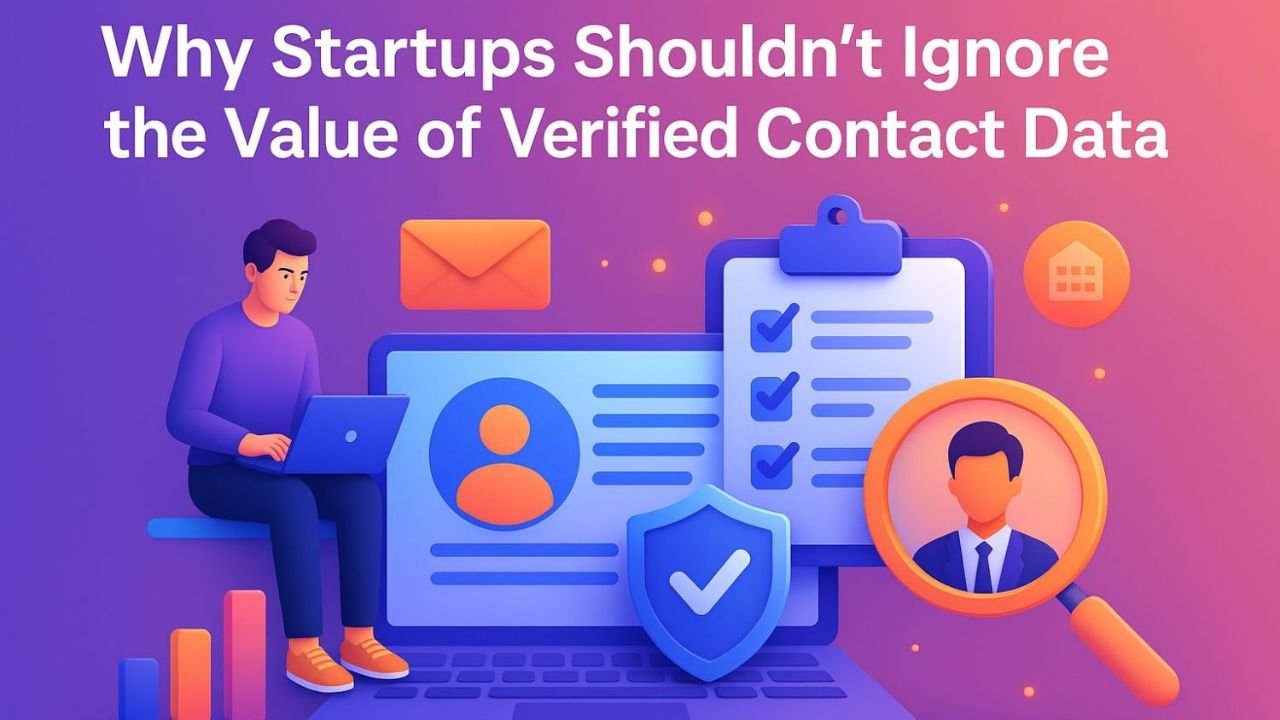Startups exist in an environment where decisions matter. Budgets tend to be tight, time is scarce, and demands are pressing. Customer acquisition is one of the biggest dimensions of the early stages of growth. To that end, outreach is very significant. Be it over the phone, via email, or in social interaction, how a company reaches out to its future customers relies on one key ingredient, and that is data. To be more exact, verified contact data.
Most new companies do not realize the importance of verified contact information and pick a cheaper and quicker solution, which can be of even lower quality. However, the use of unreliable information can only drag things down instead of hastening them. Confirmed information will result in improved targeting, conversion, and efficient sales and marketing processes.
What is Verified Contact Data
Defining Verified Contact Data
Verified contact data can be defined as contact information that is substantiated about its accuracy and authenticity. This consists of phone numbers, email addresses, job titles, and company names, among others. The check is made so that every point of data is about a real person who works in a real company and can be contacted with a legitimate business approach.
Characteristics of Verified Data
- Recent revision and verified. According to regular updates
- Verified by various sources of good standing
- Real-life business match-ups
- These are grouped according to business-related filters (e.g., industry or role)
Why Verified Data Matters?
Data accuracy can determine the success of each outreach campaign. Once the information is accurate, therefore, more people get involved, and outreach becomes effective. The resources are wasted when the data is outdated or inaccurate.
The Cost of Using Inaccurate or Unverified Data
Time Wasted on Wrong Leads
A major disadvantage of contacting people with unverified contact data is the time wasted contacting them when they have left the listed company or have wrong titles. This reduces productivity.
Poor Campaign Performance
Consumption of erroneous data will lead to poor open rates, bounce backs, and a low probability of engagement. This impacts email deliverability as well as harms domain reputation.
Higher Operational Costs
The more one uses their time in ensuring that leads are verified manually, the less time they use on activities that will advance results. Bad data usually compels organizations to employ people to clean and handle records.
CRM Overload
The absence of verifying information inevitably leads to CRM systems being filled with outdated or inaccurate contacts and, thus, the restriction of conducting meaningful reports and further targeting particular audiences.
How Verified Data Supports Startup Sales Strategy
Boosts Response Rates
When the outreach target depends on the confirmed contact data, the possibility of delivering the message to the desired person is higher. This raises the chance of receiving a response or setting up a meeting.
Enhances Personalization
Access to accurate information will enable the sales teams to tailor their communication. It strengthens the relationship and creates trust as well.
Reduces Bounce Rates
Valid email addresses and phone numbers minimize the chances of clogging the mail. This saves in terms of keeping the domain reputation and keeping clean outreach workflows.
Enables Targeted Outreach
Correct contact information assists in segmentation by industry, geographic area or job role. There is no need to stretch themselves out, and startups can focus on the right audience.
Why Verified Data Matters More During Growth?
Foundation for Scalable Outreach
As New Businesses expand, their social reach must expand with them. Quality contact data allows establishing a stable basis, as the overall outreach process does not break as the speed increases.
Supports Clear Reporting
When the data is good, reports will be more reliable. Concepts like conversion levels, pipeline worth, and outreach success are simpler to quantify.
Keeps CRM Organized
Confirmed information assists in orderly and clean records in the CRM systems. This improves the team alignment and increases productivity.
Reduces Data Overlap
De-duplication can be found in verified databases. This will prevent duplication of contacts, making the outreach effort both focused and effective.
What to Look for in a Verified Data Provider
Frequency of Updates
The finest data providers update their databases periodically. When you need to search out the up-to-date sources, search for ones that update the data on a weekly or monthly basis.
Data Transparency
One should be aware of the source of data. Quality vendors tell their sources and methods of verification.
Custom Filters
Industry, job title, company size, and location filters are provided so one can easily narrow down to specific lists that cater to the goal.
Regulations Compliance
Make sure that the data provider is within the rules of regional and global protection of data. It prevents legal problems and attracts the trust of prospects.
Customer Support and Flexibility

The components of data providers should be reliable and provide customer services, and be open to feedback or requests. Price and format of delivery flexibility may also come in handy.
Misconceptions Startups Have About Lead Data
The List can be Any List
Startups tend to believe that contacts are all that count. However, volume is no substitute to accuracy.
The More the Data, the More the Success
Effective outreach is based on reaching the right people. Validated data gives potential value to every contact.
It is Too Early to Worry About Data Quality
The quality contact data may save time and help move further even at the beginning of the trip. When it is done properly initially, problems are avoided.
Building Smarter Outreach From Day One
Companies that deploy validated contact information early have improved chances of developing repeatable reach systems. All events from prospecting to the sales talk are more efficient. Verified data enhances contact rates, makes systems clean, and adds smart decision-making.
You should stop viewing lead data as a secondary consideration but rather as an important resource. Become more successful with marketing messages, individualized interaction, and save time.
Frequently Asked Questions
What is the difference between verified and unverified contact data?
Known contact information is also verified and validated with reliable sources. Uncertified information can be old or wrong, which implies ineffective outcomes.
How often should lead data be refreshed?
Lead data must be updated on a regular basis, preferably after every 30-60 days, based on the rate of changes in your target industry.
Can verified contact data improve sales results?
Yes, this helps to increase the connection rates, lower bounce rates, and conduct personalized outreaches, all of which translate into improved sales results.
Is verified data only useful for large companies?
No, authenticated information is particularly crucial to a small company and a startup that has few resources. It assists in targeting the appropriate prospects.
What should startups look for in a data provider?
They ought to seek accuracy in data, regular refreshment of data, transparency, filtering ability, in addition to legal compliance.
Conclusion
Startups have to ensure that they make every contact attempt to work. All that can be done is only with valid, actual, and confirmed contact information. Although the idea of reducing expenses might sound tempting in the short term, working with low-quality data can slow down your development and cause the loss of momentum.
Eliminating guesswork in sales and cutting on wasted effort, startups can create a more efficient sales strategy, based on real, verified data that they can build on and scale up much better informed. Investing in data quality is not only a matter of technical fact; it is certainly a strategic decision that will affect all aspects of your business outreach.




